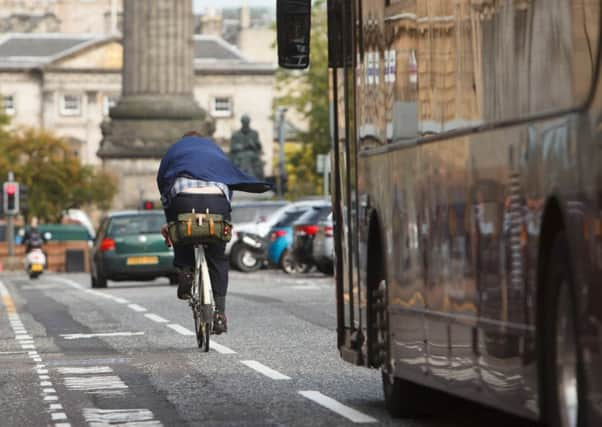Brenda Mitchell: Cyclists face ‘David v Goliath’ road laws


In recent months, I have acted for a cyclist who was forced into a year-long battle against the insurance company of a BMW driver that went to great lengths to disprove his story. The motorist, illegally parked, opened the car door into the path of my client causing him to fall from his bike and break his wrist. He claimed the cyclist had scratched the paintwork along the side of his car, despite witness statements and photographs of the scene that backed my client’s version of events.
In another case, a cyclist who was hospitalised following a collision with a minibus, won an apology from Police Scotland who admitted to failing to investigate the incident or prosecute the driver, who was later found to be negligent in a Civil action.
Advertisement
Hide AdAdvertisement
Hide AdBoth reflect a ‘David v Goliath’ culture when it comes to road traffic collisions where a cyclist or pedestrian is hit by a motor vehicle. As a result, the odds are frequently stacked against the vulnerable individual and, in many cases, receiving compensation from the driver’s motor insurance company quickly and fairly is impossible without resort to litigation. This only adds to the distress for those who have been injured through no fault of their own.
As a specialist Lawyer at Cycle Law Scotland and the founder of the Road Share campaign, we are now taking this latest evidence to Scotland’s MSPs to urge them to adopt presumed liability for Scotland’s vulnerable road users.
We argue that the current system of civil law which requires the vulnerable road user – the injured and the bereaved – to prove the case against the more powerful, fails to recognise the destructive disparity between motorised vehicle use and walkers or cyclists.
Under presumed liability, a pedestrian or cyclist injured in a collision with a motor vehicle would be compensated unless the driver’s motor insurer can establish fault on the part of the cyclist or pedestrian. The presumption of liability rests with the motor insurer as their policyholder is in control of the object of danger and brings most harm to the event. We believe that if such a presumption of liability was in place, insurance companies would quickly re-evaluate their prospects of success, meaning faster resolution of claims for damages, cost savings and far less stress. Presumed Liability will not enable cyclists or pedestrians to recover compensation for their injuries automatically and if a cyclist or pedestrian has caused the collision resulting in injury, they will not receive compensation.
We are pressing the political parties that care about social justice and protecting the vulnerable in our society to incorporate the Road Share proposals for presumed liability in their 2016 manifestos as we can no longer sit back and watch the current legal system fail the Nation’s cyclists and pedestrians. We need to ensure the individual sits at the very heart of our civil legal system.
Scotland has the opportunity to catch up with the its European neighbours and lead the rest of the UK by changing its Civil law to respect and protect the vulnerable in society by moving to a system of presumed liability. It allows for recognition of who brings most harm to a collision and, in so doing, shifts the burden of proof from the vulnerable to the more powerful. If liability for a collision between a cyclist and motorist falls on both parties or on one party more than the other, that can be accounted for. Most importantly, it offers a fairer and more responsible approach to compensating vulnerable road users and would certainly rid us of the David v Goliath battle many currently face against a motor insurer. Show your support by signing our online petition.
Brenda Mitchell is a specialist lawyer at Cycle Law Scotland and the founder of the Road Share campaign